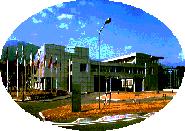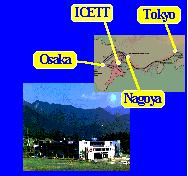Home > International Cooperation > Fiscal Year 2001 > Energy Efficiency Workshop in 2002 > Workshop Agenda 2002
Main content starts here.
Update:April 1, 2010
Workshop Agenda 2002
CTI ENERGY EFFICIENCY WORKSHOP 2002
1. BACKGROUND

ICETT Overview
The International Center for Environmental Technology Transfer (ICETT), implements, under the guidance of the Ministry of Economy, Trade and Industry (METI), supported by the New Energy and Industrial Technology Development Organization (NEDO), human resource development and capacity-building support to developing countries through its various training, workshop and research projects. Since 1992, the Center has received 1,296 professional participants from some 60 countries. The training, workshop and research projects focuss on two major areas; environmentally friendly conservation and sustainable development. The training, workshop and research projects are between several days and three months. ICETT will deliver the expected outcomes through substantial case-studies and discussion, and field study visits to provide insights into Japan's development experiences. It consists of three modules: (1) energy efficiencys, (2) green productivity / cleaner production and (3) zero emissions.

ICETT Location
The Capacity Building Working Group of the Climate Technology Initiative (CTI), which is comprised of OECD member countries and the European Commission, convened in a series of Energy Efficiency Workshops, October 5 - 10, 1998, September 18 - 26, 1999, September 10 - 23, 2000 and October 7 - 20, 2001 at ICETT. With the supports of the NEDO, ICETT implemented and hosted the workshop at this facility in Yokkaichi City, Mie Prefecture, Japan.
Following the Energy Efficiency Workshop in FY2001, ICETT will hold the CTI Energy Efficiency Workshop, from October 20 - November 2, 2002, targeted for fifteen (15) participants from five countries with these economies, the People of Republic of China, the Republic of Indonesia, the Republic of the Philippines, Kingdom of Thailand and the Socialist Republic of Viet Nam. The mission of the CTI is "to promote the objectives of the U.N. Framework Convention on Climate Change (UNFCCC) by fostering international cooperation for accelerated development and diffusion of climate-friendly technologies and practices including greenhouse gases."
2. OBJECTIVES
The objectives of this CTI workshop will be:
- (1) to transfer information about energy efficiency technologies to and among developing countries;
- (2) to identify and overcome barriers to implementation of climate-friendly technology;
- (3) to identify future directions and activities for energy-efficient technology transfer; and
- (4) to receive participant feedback in order to improve the content and effectiveness of future workshops.
3. WORKSHOP CONTENTS
- (1) Title:CTI Energy Efficiency Workshop
- (2) Duration: From October 20 to November 2, 2002
- (3) Number of Selected Participants : (three persons from each country) 15 participants from
the People of Republic of China,
the Republic of Indonesia,
the Republic of the Philippines
Kingdom of Thailand and
the Socialist Republic of Viet Nam - (4) Workshop Justification:
Developed countries and developing countries recognize that energy efficiency and environmental conservation with regard to issues of climate change are global issues and that we need international cooperation in order to deal with these problems. In Asian developing countries, there has been a rapid expansion of industrialization. There is also a growing recognition that energy- efficient technologies and approaches, and policies on energy efficiency are urgent issues to be solved in order to maintain sustainable development.
4. WORKSHOP ACTIVITIES
Workshop activities will include lectures, interactive discussions, country study reports, and industrial site visits in the Chubu Region. The lectures and discussions will be focused on energy-efficient technologies, approaches, and policies that are being developed and implemented in the international institutions, the USA, Australia, Malaysia and Japan. Specifically, the workshop sessions will highlight such topics as existing and emerging energy-efficient technologies, green productivity / cleaner production, zero emissions, the beneficial reuse and recycling of materials, the importance of low cost good maintenance practices and human resources development, existing information sources, and national energy efficiency program elements and strategies. In addition, the participants will share their own expertise and present reports on their nations' energy use and activities for energy efficiency.
A wide range of energy-efficient technologies and practices will be explained and discussed. Technology transfer barriers, such as accessing information, evaluating the reliability of information and technologies, overcoming the disincentives of existing energy pricing structures, and the practice of transferring older, more inefficient technologies to developing nations, will be discussed. Participants and lecturers will work together to identify steps that could help overcome these barriers.
Participants:
Participants will learn about global climate issues, energy efficiency, resource saving and green productivity / cleaner production, and will acquire knowledge about energy-efficient technologies, green productivity / cleaner production and zero emissions, including sector-specific technologies and renewable energy.
The participants will acquire the skills necessary to plan, manage and implement energy-efficient activities, technologies and green productivity / cleaner production in their facilities to support their countries' environmental and energy efficiency objectives.
Moreover, the participants will be managers who work on energy efficiency, green productivity / cleaner production and zero emissions in governmental agencies and enterprises in Asian countries. They will attend this workshop primarily to learn how and why to pursue activities for energy efficiency, for green productivity / cleaner production and for zero emissions in their government agencies or enterprises. Some may also have leadership roles in their country and are expected to help influence for national policy. They will be interested in and want to learn about broader global environmental issues and government activities, however, their primary role is managing facilities, particularly for energy efficiency, green productivity / cleaner production and zero emissions. As such, they are the only people who can implement the actual technological and procedural changes that will reduce the gases caused by industrial energy use which are responsible for global warming. They will expect to leave this workshop
prepared to identify and implement energy efficiency programs in their enterprises.
Participants are engaged in governmental organizations, administrative agencies, manufacturing enterprises and energy production related organizations, as follows:
Participants will:
- (1) be preferably director / manager status in governmental organizations, administrative agencies, and energy/ production related public organizations
OR be preferably director / manager status in manufacturing enterprises, such as steel industrial
plant, oil refinery plant, cement plant, fertilizer plant and pulp enterprises and so on. - (2) be a university graduate of science or posses equivalent knowledge and/or professional experience;
- (3) be in good health so as to undertake this workshop programme;
- Due to health concerns, pregnant women may not participate in the programme. - (4) have a fluent command of English;
- (5) have systematic understanding of administrative decision making or industry processes;
- (6) currently have a leadership position;
- (7) know how to find, access and use information sources, experts, and tools; and
- (8) have an enthusiastic attitude towards improving the problems of global warming through energy efficiency, green productivity / cleaner production and zero emissions;
Participants will be expected to:
- (1) consider the "action-plan" or "action-programme" on energy efficiencys, green productivity / cleaner production and zero emissions at the administrative management in government organizations, administrative agencies, and energy/ production related public organizations;
- (2) understand the present situation of energy efficiency technology, resource saving technology, green productivity / cleaner production and zero emissions in manufacturing enterprises, and / or
- (3) have some future plans to use energy efficiency by reducing a large amount of energy consumption.
Resource Persons:
The core group of resource persons from the International Institutions, USA, Japan and the other countries and institutions will bring a variety of expertise and experiences to the workshop. They should remain focused on the needs of the workshop participants, which are to acquire knowledge, motivation, resources, and the know-how for planning and practical implementation. Given this, the resource persons should have experience working directly with industry and with industrial energy-efficient technologies, green productivity / cleaner production and zero emissions. They should plan to work directly with participants on problem-solving exercises for specific plant issues. The resource person's role is to assist the workshop participants and to help create a positive situation for effective learning and communication. Particularly, the resource person will help ensure that the workshop has defined the correct objectives and that the workshop then remains focused on achieving those objectives. The resource per
son is also responsible for implementing, with input from participants, the discussion sessions and for facilitating these discussion sessions. The resource person will also help moderate the sessions and keep track of time and the agenda.
Organizers:
ICETT is responsible for the overall execution of the Workshop. They will provide the facilities, arrange the agenda and field trips, manage the budget, advertise the workshop to find participants and lecturers and ensure that all administrative aspects of the Workshop fit together and function smoothly. They will provide rooms for resource persons, materials for exercises, and computers for internet training.
4. PROGRAMME
In order to achieve the above-mentioned objectives and motivate the participants, ICETT will provide lectures, tutorials, plant-visits and discussion with resource persons from International Institution and Japan. In particular, methodological case-studies and practical workshops will be highlighted.
In addition to regular training session programmes, special programmes will be introduced, such as workshop sessions held on October 20 - November 3. The participants will examine how to promote energy efficiency measures, energy efficiency, green productivity / cleaner production and zero emissions, and examine how to create a technical brochure and workshop report, as output from the sessions.
5. WORKSHOP INSTITUTIONS :
All documents from participants should be submitted to:
c/o Inter Group Corporation
Sakae East Bldg., 4-2-7 Sakae Naka-ku Nagoya, 460-0008 JAPAN
Phone: 81-52-263-6261 FAX: 81-52-263-6298
(Person-in-charge, Mr Hide MASHITA, Planning and Research Division)
International Center for Environmental Technology Transfer (ICETT)
Address: 3690-1, Sakura-cho, Yokkaichi, Mie 512-1211, Japan
Phone: 81-593-29-3500 Fax: 81-593-29-8115
URL http://www.icett.or.jp







